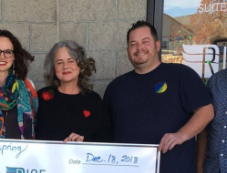Are SLO officials skirting laws to protect marijuana kingpin?
February 16, 2019
 Editor’s Note: This is first in a series about allegations of backroom deals in the battle to control the local marijuana market and San Luis Obispo officials’ attempts to withhold public information.
Editor’s Note: This is first in a series about allegations of backroom deals in the battle to control the local marijuana market and San Luis Obispo officials’ attempts to withhold public information.
By KAREN VELIE
San Luis Obispo city officials are refusing to release details of marijuana store application forms as questions have been raised about the fairness of the process for picking who will be allowed to open local retail marijuana stores. [Cal Coast Times]
And, as city officials denied requests for public records about the nine applications filed in January, they also refused to divulge information about a fundraiser hosted by one of the applicants. Mayor Heidi Harmon and two current city council members all failed to report the fundraiser on their financial disclosure forms.
For more than two weeks, city officials have refused to allow CalCoastNews to review the marijuana store applications at city offices, posted redacted copies of applications online and repeatedly delayed the release of public records that could shine a light on the process of selecting the people who will be able to operate retail marijuana stores in the city.
The city attorney’s office has acknowledged in nearly three in four cases that its initial decisions to censor portions of records were improper under the law — but only after challenged by a reporter.

Heidi Harmon and Helios Dayspring
On Oct. 28, marijuana mogul Helios Dayspring and his marijuana brand Natural Healing Center hosted a fundraiser for eight politicians from local cities planning to open cannabis shops in the near future, including three from San Luis Obispo. Mayor Heidi Harmon and council members Carlyn Christianson and Erica Stewart then won their elections. But all three candidates failed to report the cost of the fundraiser on their financial disclosure form.
Almost a month later, on Nov. 27, the SLO City Council unanimously passed a resolution establishing criteria to rank marijuana shop applicants. It created a point system under which the city would award the top point earners the coveted pot shop permits. Legal marijuana shops regularly garner between $5 million to $10 million a year in sales in California.
The point system decision drew criticism that city officials were rigging the selection process in favor of certain local pot business owners, including Dayspring.
During the discussion, Harmon and Christianson sought extra points for people who live locally. In May 2018, Dayspring purchased a home on Los Osos Valley Road near Foothill Boulevard.
Harmon was also successful in granting eight extra points to marijuana businesses with at least three people, with 2 percent or greater ownership, who earned below the median income at the time of the application. Dayspring’s application lists four additional owners, each with 3 percent ownership, earning him the eight extra points.
One of the owners is Nick Andre, who along with Harmon founded and later co-chaired the SLO County Progressives. In his application, Dayspring includes photos of himself with leaders in the SLO Progressives including Harmon and SLO County Supervisor Adam Hill.
In late January, nine applicants applied for the three available cannabis retail shop permits. But city staffers have yet to release eight of the nine applications while posting a heavily redacted copy of Dayspring’s Natural Healing Center application on the city’s website. A review of the application shows Dayspring is in line to receive the top points available in almost every category.
City officials have refused to allow reporters to review the applications at the counter or to receive the applications through a public records request. Instead, the city attorney’s office claims posting a heavily redacted copy online satisfies the city’s transparency requirements.
While government agencies can redact documents posted on government websites, planning permit applications and many other public records are required to be viewable without redacting names and contact information at the counter upon request or in an email following a public records request.






The comments below represent the opinion of the writer and do not represent the views or policies of CalCoastNews.com. Please address the Policies, events and arguments, not the person. Constructive debate is good; mockery, taunting, and name calling is not. Comment Guidelines